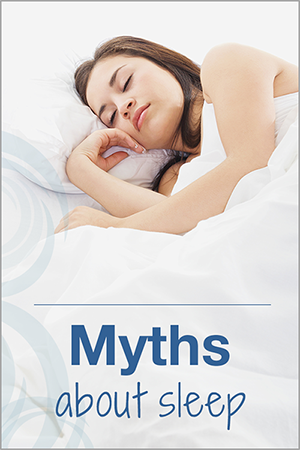
There are several common myths about sleep, including the following1:
The act of snoring, by itself, is often harmless. However, in some people, it can signal a life-threatening disorder called sleep apnea.2 Sleep apnea causes pauses in your breathing that can last for seconds or minutes, dozens of times each hour. These pauses disrupt your sleep and cause you to wake up or sleep only lightly, which can make you feel extremely tired during the day. The pauses also reduce the amount of oxygen in your blood and can cause damage to the heart and blood vessels, which increases the risk of heart disease.3 Sleep apnea also increases the risk for high blood pressure, stroke, and diabetes.2
Fortunately, sleep apnea is treatable. People who snore loudly, have pauses in breathing during sleep, and feel very tired during the day should speak with a healthcare provider. Visit https://www.nhlbi.nih.gov/health-topics/sleep-apnea for more information on sleep apnea.
Despite popular belief, you can’t regain or catch up on “lost” sleep by sleeping more at another time. Being sleep deprived means you accumulate a sleep debt that is impossible to “repay” as it gets larger. In addition, long-term sleep deprivation puts you at risk for health problems and may impair your safety and work performance. Sleep deprivation has been linked to obesity, high blood pressure, negative mood and behavior, decreased productivity at work, and safety issues in the home, on the job, and on the road.4 Catching up on sleep may help to reduce daytime sleepiness or drowsiness, but it does not reverse the effects of not getting enough sleep or enough quality sleep each night.
Sleep experts recommend 7 to 9 hours of sleep for most adults. While sleep patterns may change as we age, the amount of sleep the body needs does not usually change. Older people may wake up more frequently throughout the night and end up getting less sleep during the overnight hours. Older adults are more likely to be taking medicines that interfere with sleep.5 However, their need for sleep is not drastically less than that of younger adults. Older people may take more naps during the day because they get less sleep at night.
To learn more about these and other sleep myths, visit the National Sleep Foundation website: https://www.sleepfoundation.org/articles/myths-and-facts-about-sleep .
Citations
Open Citations- National Sleep Foundation. (n.d.). Myths and facts about sleep. Retrieved March 26, 2019, from https://www.sleepfoundation.org/articles/myths-and-facts-about-sleep
- National Heart, Lung, and Blood Institute. (n.d.). Sleep apnea. Retrieved June 12, 2017, from https://www.nhlbi.nih.gov/health-topics/sleep-apnea
- Floras, J. S. (2014). Sleep apnea and cardiovascular risk. Journal of Cardiology, 63(1), 3–8. Retrieved June 19, 2017, from https://www.ncbi.nlm.nih.gov/pubmed/24084492
- National Heart, Lung, and Blood Institute. (2009). At-a-glance: Healthy sleep. Retrieved June 12, 2017, from http://www.nhlbi.nih.gov/health/public/sleep/healthy_sleep_atglance.pdf (PDF 1.80 MB)
- National Institute of Neurological Disorders and Stroke. (n.d.). Brain basics: Understanding sleep. Retrieved June 12, 2017, from https://www.ninds.nih.gov/Disorders/Patient-Caregiver-Education/Understanding-Sleep

 BACK TO TOP
BACK TO TOP